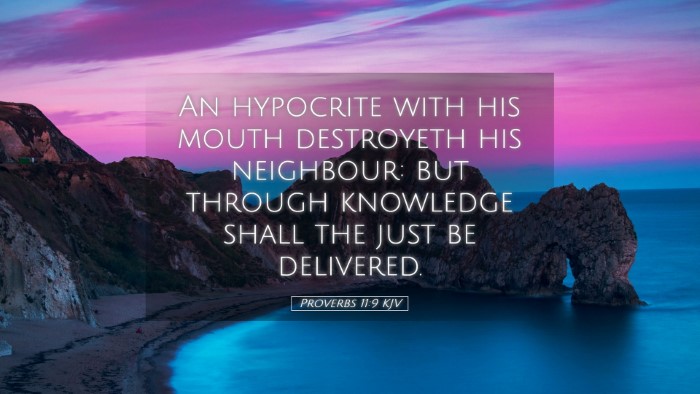Proverbs 11:9 Commentary Summary
Bible Verse: "With his mouth the godless man would destroy his neighbor, but by knowledge the righteous are delivered." (Proverbs 11:9, ESV)
Introduction
This verse serves as a profound reminder of the power of words and the stark contrast between the wicked and the righteous in their speech. The commentary from public domain sources provides valuable insights into the dynamics of communication, relationships, and the moral implications of speech.
Exegesis and Analysis
- Context: Proverbs is a collection of wise sayings attributed primarily to Solomon. It contrasts righteous living with wickedness and outlines the consequences of each path.
- The Godless Man: The term “godless” denotes one who is devoid of fear of God and acts with malice. Matthew Henry notes that such individuals may use their words as weapons, bringing destruction upon their neighbors.
- Destruction by Speech: Albert Barnes emphasizes the destructive nature of the wicked man's speech. Words can ruin reputations and relationships, illustrating that a mouth is capable of immense harm when unbridled by righteousness.
- The Righteous and Knowledge: Conversely, the righteous are portrayed as those who utilize knowledge for deliverance. Adam Clarke points out that wisdom guides the righteous, enabling them to avoid pitfalls and destructive interactions.
Contrasts in Character
The contrast between the godless and the righteous individuals is crucial in this verse. The godless act with an intention to harm, driven by selfish motives and indifference to the well-being of others. They may manipulate truths or fabricate lies, demonstrating the power of negative speech.
In contrast, the righteous, characterized by their relationship with God and knowledge, utilize their words to uplift, counsel, and educate. Their speech is rooted in wisdom, which leads to their deliverance from dangers, whether they be from external criticism or internal turmoil.
The Power of Knowledge
- Healing and Restoration: Knowledge in this context encompasses not only intellectual understanding but also spiritual insight. This understanding allows the righteous to navigate life's trials effectively. As Barnes describes, knowledge can guide us away from threats posed by the venomous words of the wicked.
- Application in Ministry: Pastors and ministry leaders must recognize the significance of their words. By speaking truth and wisdom, they have the ability to nurture community and foster understanding, contrasting sharply with those who misuse their words.
The Moral and Ethical Implications
Both figures presented in this verse compel us to consider our own speech and its ramifications. The godless man's intent creates a ripple effect of destruction, which can manifest in familial discord, community strife, and even spiritual harm.
The righteous man's knowledge, however, is transformative. It brings about not only self-preservation but also aids in the deliverance of others. This reinforces the idea that Christians are called to be vessels of reconciliation and sanity amidst chaos.
Conclusion
Proverbs 11:9 serves as an urgent reminder of the dual nature of speech and its capacity to either build up or tear down. Through the combined insights of Henry, Barnes, and Clarke, we are encouraged to reflect on our own conduct, evaluate the knowledge we possess, and strive to wield our words with wisdom. Understanding the implications of our speech is an essential part of living a righteous life in service to God and neighbor.


